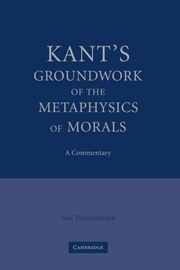Book contents
- Frontmatter
- Contents
- Acknowledgements
- Note on quotations from Kant's works
- Introduction
- Kant's Groundwork: synopsis of the argument
- Commentary
- Preface
- Section I Transition from common to philosophic moral cognition of reason
- Section II Transition from popular moral philosophy to the metaphysics of morals
- Section III Transition from the metaphysics of morals to the critique of pure practical reason
- Appendix A Schiller's scruples of conscience
- Appendix B The pervasiveness of morality
- Appendix C Universal legislation, ends and puzzle maxims
- Appendix D ‘Indirect duty’: Kantian consequentialism
- Appendix E Freedom and moral failure: Reinhold and Sidgwick
- Appendix F The project of a ‘metaphysics of morals’
- Glossary
- Bibliography
- Index
- References
Section II - Transition from popular moral philosophy to the metaphysics of morals
Published online by Cambridge University Press: 24 February 2010
- Frontmatter
- Contents
- Acknowledgements
- Note on quotations from Kant's works
- Introduction
- Kant's Groundwork: synopsis of the argument
- Commentary
- Preface
- Section I Transition from common to philosophic moral cognition of reason
- Section II Transition from popular moral philosophy to the metaphysics of morals
- Section III Transition from the metaphysics of morals to the critique of pure practical reason
- Appendix A Schiller's scruples of conscience
- Appendix B The pervasiveness of morality
- Appendix C Universal legislation, ends and puzzle maxims
- Appendix D ‘Indirect duty’: Kantian consequentialism
- Appendix E Freedom and moral failure: Reinhold and Sidgwick
- Appendix F The project of a ‘metaphysics of morals’
- Glossary
- Bibliography
- Index
- References
Summary
To reform moral philosophy, Kant makes a fresh start at a more technical level. He proceeds, again by means of conceptual analysis, via one familiar and three (or so) new formulations of the principle of morality, from a general characterisation of the will to a discussion of the concept of autonomy. There are implicit references to ‘popular’ moral philosophy throughout. It is criticised for failing to distinguish between the pure and the empirical elements of volition, and for its confused attempts as a result to derive ethical theory from examples, i.e. ethical role models.
The main argument of the section starts with Kant's definition of the will. Via the distinction of various types of volitional faculty, and the various types of imperatives that address a human will, this leads to the general formulation of the categorical imperative, familiar from Section I. In the Preface, Kant declares a general definition of the will an unsuitable foundation of moral philosophy. Distilling the morally relevant parts of human volition he now demonstrates that he can succeed at a task his predecessors did not even realise was necessary. A first variant – the ‘law-of-nature’ formula – follows. It takes up the Stoic ideal of ‘living in accordance with nature’, which was still fashionable amongst Kant's late eighteenth-century colleagues. Similarly, the second variant uses the definition of the final good as expounded by teleological ethical systems. The third alludes to the Leibnizian idea of a ‘kingdom of grace’.
- Type
- Chapter
- Information
- Kant's Groundwork of the Metaphysics of MoralsA Commentary, pp. 50 - 119Publisher: Cambridge University PressPrint publication year: 2007



